 About GamePeople
About GamePeople
Subscribe to the Story Gamer column:![]() RSS or
RSS or
![]() Newsletter.
Newsletter.
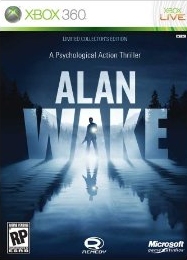
Format:
360
Genre:
Adventuring
Style:
Thirdperson
Singleplayer
Buy/Support:
Support Mark, click to buy via us...
Other GamePeople columnists have reviewed this from their perspective - huh?:
Family Gamer (360)
Soulful Gamer (360)
Perpetual Gamer (360)
Returning Gamer (360)
Scripted Gamer (360)
Scared Gamer (360)
Considered Gamer (360)
Tech Gamer (360)
Dressup Gamer (360)
Podcast (360)
Soundtrack Gamer (OST)
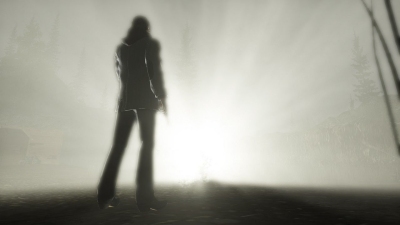
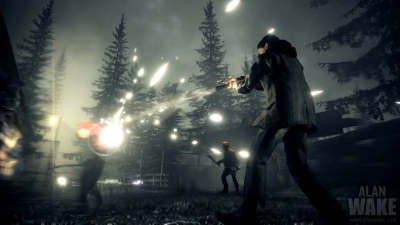
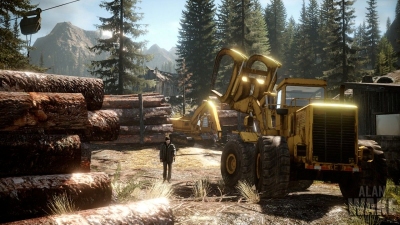
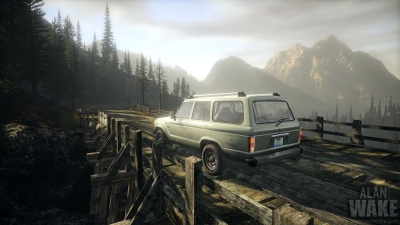
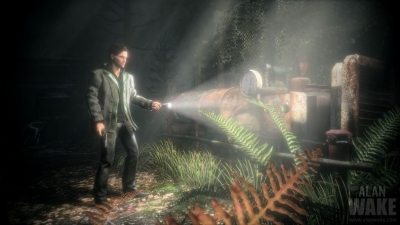
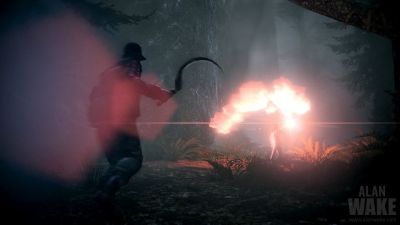
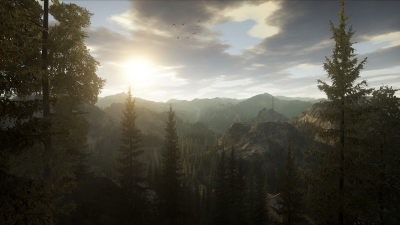
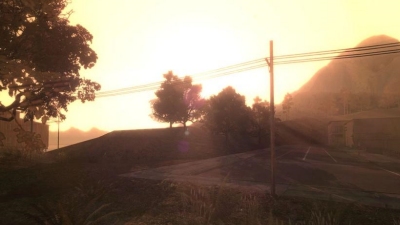

Further reading, films and books that create similar stories:
Alan Wake 360 is a linear but beautifully executed horror thriller with a real sense of place and tremendous atmosphere. The plot may be hokey, but Alan's headlong flight through the dark is an unforgettable gaming experience.
Most adults aren't afraid of the dark in the way children are. Most of us can negotiate our own homes in a powercut. I, for one, can find my way from my bed to the bathroom without switching the light on, with maybe only four or five furniture-collision-related injuries suffered along the way.
But that's at home, within a controlled environment, where even powercuts can be fun, providing you remembered to stock up on candles and matches. At home, these minor deprivations are an adventure.
Out in the wild, though, it's a different story. Countryside that was picturesque and tranquil in the day becomes threatening and full of minor hazards in the dark. Even the most amiable stretch of woodland becomes problematic at 3am.
You could fall, break something, drown in a river, all because you couldn't see where you were going. Even a minor injury could become a nightmare with little chance of being found before dawn.
Alan Wake takes this nightmare scenario and runs with it. More precisely it forces the player to run with it, dashing headlong through thick woodland littered with traps and hazards, all the while assailed by enemies that prosper in the dark, shadow creatures who can only be defeated by bursts of intense light.
The darkness is the enemy, and light is the saviour. Playing Alan Wake, I couldn't just shoot the bad guys: first I needed to pin them with torchlight long enough to burn away the thick shadows rippling across their skins. Then, with the shadows burned away, I could fire, watching the weakened enemy disintegrate in a slow-motion shower of sparks.
Alan Wake forces the player to run with it, dashing headlong through thick woodland littered with traps and hazards, all the while assailed by enemies that prosper in the dark.
When I got hold of a flaregun or some magnesium flashbangs, I could really turn the tables, burning right through the shadows and the enemy alike with explosive effect, but those kind of assets are rare, and the game repeatedly finds plot excuses to strip away inventory and reduce you to basics. In those circumstances, I had no defence but to run.
In Alan Wake, the next torch battery, the next pool of lamplight on a footpath, the next generator that (once painstakingly chugged back into life via a ripcord,) fuels a bulb above you, is a vital lifeline.
Down to my last torch battery, I would find myself running for the light, trying desperately to dodge thrown projectiles and sharpened blades as my enemies crowded in on me.
Often, I'd fail, brutally struck down in mid-flight, safety tantalisingly close.
And it seemed such a nice town during the day.
Bright Falls, the picturesque former logging and mining town in which troubled writer Alan Wake decides to take a holiday shows one face during the day, and an entirely different one during the night.
Away from the nature trails, Bright Falls is a small town with a long, complex industrial history.
Both faces are absolutely stunning. Aside from some lipsynching issues with the characters, Alan Wake is comfortably one of the best looking games on the 360, and that's mainly due to the beautiful environments: looking out over Crater Lake, the substantial draw distance allows you to see Mirror Peak on the other shore, towering above. On a smaller scale, the tree branches and blades of grass shift in the breeze as you walk through the forest. It's all stunningly naturalistic.
Away from the nature trails, Bright Falls is a small town with a long, complex industrial history: it's been a mining town, and a logging town, and the remnants of both industries are littered around the countryside.
Bright Falls is located in the Pacific North West, an area that has a certain iconic weight for fans of David Lynch's Twin Peaks, and Alan Wake has a similarly opaque supernatural plotline with mysterious dark forces at work, a small town with eccentric residents, and a metatextual playfullness.
It's a brave comparison to encourage, as Twin Peaks is one of the greatest achievements of television drama as a medium, but while it isn't that clever, Alan Wake doesn't disgrace itself.
(Incidentally, if just one Storygamer reader who hasn't seen Twin Peaks decides to do so based on my recommendation, then my work here will have been worthwhile. The link is on the right.)
While it may not by David-Lynch-level smart, Alan Wake is certainly clever enough for a videogame.
While it may not by David-Lynch-level smart, Alan Wake is certainly clever enough for a videogame. The episodic narrative, as Alan searches for his missing wife, features flashbacks, flash forwards and a story within a story which Alan picks up page-by-page in-game, and which often runs ahead of the game narrative itself.
There's a rather grand subtext here about authorial creation and the power of creativity, one which isn't quite matched by the hokeyness of the supernatural plotline and the pulpy prose of Alan's own writing, but it doesn't get in the way of more visceral thrills: Alan Wake is, more than anything, a game of atmosphere and tension.
The sense of a wilderness that you can get lost in may be largely illusory - the game is actually fairly linear, albeit disguised by the width of the environments through which you are subtly channelled - but that sense of being lost in a bad bad place, that sense of heart-in-mouth tension as I dashed for the light is something special.
You won't necessarily want to play it after dark - but you should.
Played at night, in a quiet house, with the lights down low, Alan Wake is a strikingly atmospheric game.
You won't necessarily want to play it after dark - but you should.



Mark Clapham writes the Story Gamer column.
"I love a good story. Games tell many different stories: the stories told through cut scenes and dialogue, but also the stories that emerge through gameplay, the stories players make for themselves."
Here are the games I've been playing recently:
© GamePeople 2006-13 | Contact | Huh?

|
Family Video Game Age Ratings | Home | About | Radio shows | Columnists | Competitions | Contact
With so many different perspectives it can be hard to know where to start - a little like walking into a crowded pub. Sorry about that. But so far we've not found a way to streamline our review output - there's basically too much of it. So, rather than dilute things for newcomers we have decided to live with the hubbub while helping new readers find the columnists they will enjoy. |
Our columnists each focus on a particular perspective and fall into one of the following types of gamers:
|